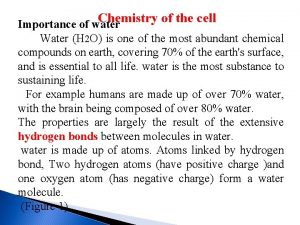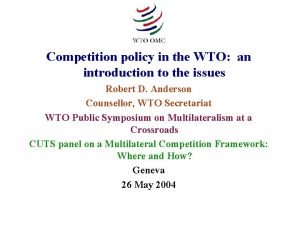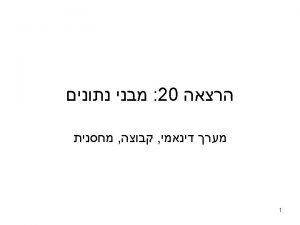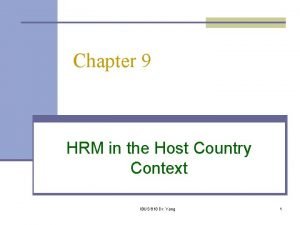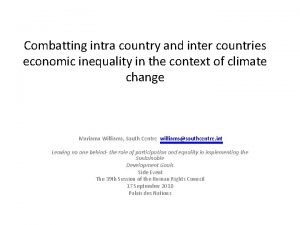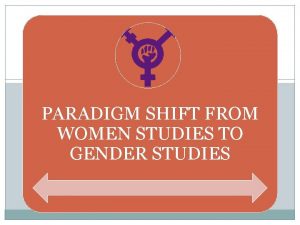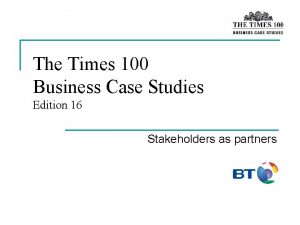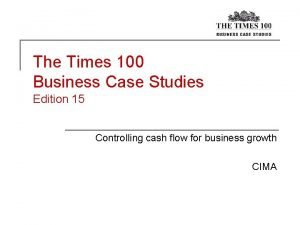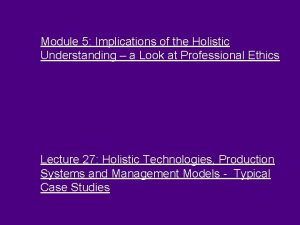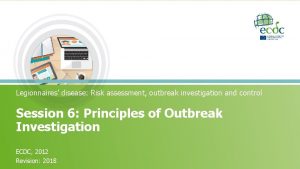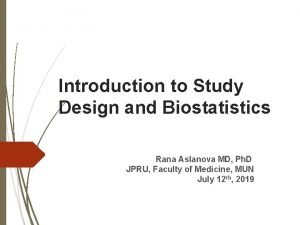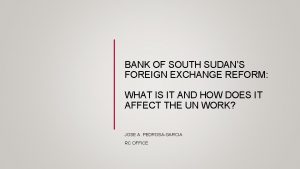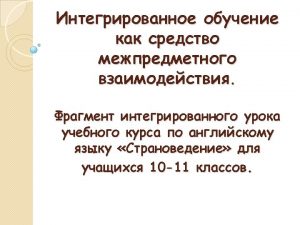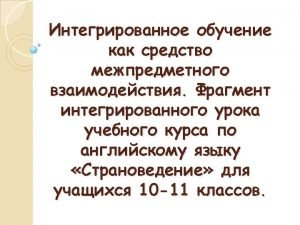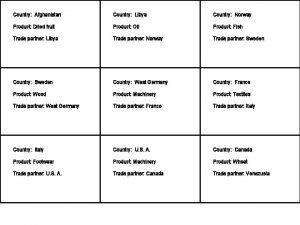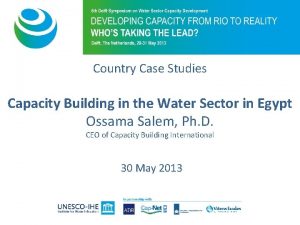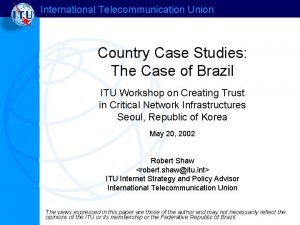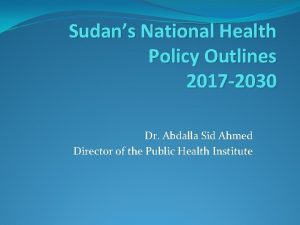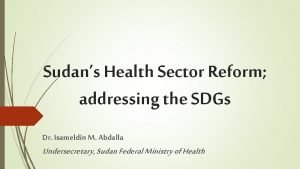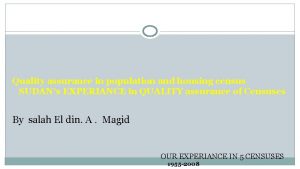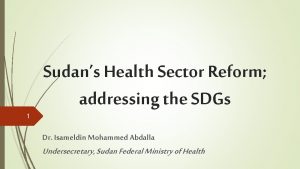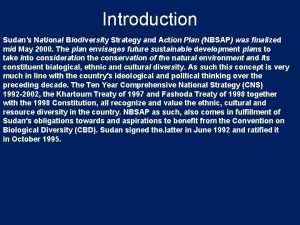Country Case Studies ASPECTS OF SOUTH SUDANS WATER

















- Slides: 17

Country Case Studies ASPECTS OF SOUTH SUDAN’S WATER SECTOR CAPACITY DEVELOPMENT “A Visionary Mission on a Long Road towards a Tangible Goal” Isaac Liabwel and Maryam Said 30 th May 2013

INTRODUCTION • The Republic of South Sudan (RSS) gained independence on July 9, 2011, following a peaceful Referendum in January 2011, as a result of the Comprehensive Peace Agreement (CPA) of 2005. This provided a platform and legitimacy for the people of South Sudan, to establish and build its administrative and functional structures. • Its area is about 640, 000 square kilometres, with the whole area located in the southern plain of the White Nile and its tributaries. • The population is estimated at 8. 3 million; with 80% residing in rural areas. • Its administration is based on a decentralized system of government, made up of 10 states, below which are a number of counties, constituting a local government.

INTRODUCTION CONT`D • It has substantial water resources that are unevenly distributed across the territory and varies substantially between seasons and years, with periodic floods and droughts. • Average rainfall per annum (ranges from less than 400 mm in the far South East and far North (Renk) Arid Areas, to more than 1600 mm in the South West Belt. • Its Water resources remain largely underdeveloped.


Core actors of the RSS water sector • The Ministry of Water Resources and Irrigation (MWRI) leads development of policies, strategies, guidelines, regulations & standards; in addition to coordination of regional; international; bilateral; donor; and other national activities, projects & programmes. • In line with the principle of subsidiarity, the responsibility for operating & managing facilities & delivering services lies with the States & Counties. • Development partners are engaged in rehabilitation, upgrading & construction of critical infrastructure; and they are also very much engaged in creating an enabling environment for sustainability by providing assistance to planning process and policy/strategy/capacity development. As of now the active partners, include: UN Systems (UNICEF, FAO, UNDP, UNESCO, UNOPS & UN-HABITAT); INGOs; DFID; World Bank; USAID; JICA; The Netherlands; GIZ/Kf. W; & Af. DB.

Enabling Environment Factors • Building up of the water sector professional workforce and its institutional arrangements. This culminated in the establishment of functional directorates/departments/units at all levels. MWRI is now consolidating establishment of the information management system and has embarked on the establishment of the training and research centre. • In place is the Water Sector Policy (2007), the Water, Sanitation and Hygiene (WASH) Sector Strategic Framework (2011), rural and urban WASH action and investment plans (2013) and the Draft Water Bill (2013).

Enabling Environment Factors cont’d • MWRI also articulated the WASH Sector objectives, outcomes and targets in the South Sudan Development Plan (SSDP) , including a national capacity building strategy; and the envisaged outputs and required actions in the South Sudan Development Initiative (SSDI). Currently, in preparation is the Irrigation Development Master Plan (IDMP); and a number of Feasibility Studies pertaining to Urban Water Supply and Sanitation, river basins’ development master plans, etc. • MWRI prepared, produced and disseminated technical guidelines and manuals for the construction, operation and maintenance of water supply and sanitation facilities; in addition to water quality guidelines and service delivery norms.

Challenges facing the RSS water sector The revealed capacity gaps have so far not been fully addressed, due to a number of reasons, among others: • South Sudan is in an environment with a shortage of specialized training & research institutions following either outdated or inappropriate curricula. • This scenario dictated that MWRI and partners could afford to take only a few individuals to be trained abroad.

Challenges facing RSS water sector Cont’d • Additionally, a number of barriers were encountered while endeavouring to achieve capacity development through training; these include: o The heterogeneous background of the workforce of South Sudan (due to education based on different media of instruction i. e. Arabic, Amharic, Kiswahili, English, etc. ); o The South Sudan decentralised system of government made it necessary to create capacity at various levels; which resulted in very expensive capacity development efforts. Thus building necessary capacities within the sector is going to be cumbersome.

Transfer of knowledge, Institutional development and Empowerment Institutionalization of Training & Research Conferences/Workshop Exposure visits Short- Medium Term & Tailor Gender mainstreaming made Training Equipment, Buildings & Supply Chain Gender Mainstreaming Technical Assistance & Projects Institutional Memory

Sector Planning & Coordination • To overcome the severe limitations in institutions, service delivery and development as a result of the long civil war, MWRI pursued an overarching institutionalized process, culminating in the setting up of the South Sudan Water Sector Steering Committee (SSWSSC). SSWSSC enabled MWRI to lead formulation of critical documents, including the policy and the strategic framework, to align, guide and enhance sector-wide coordination. • Therefore, MWRI leads and coordinates the sector, to harmonised roles of stakeholders and leverage support from partners.

Sector Planning & Coordination Cont’d • Nevertheless, sector donors have established their own Water, Sanitation and Hygiene (WASH) Donor Group (WASHDOG), where all donors share their plans and interventions. It is chaired by the World Bank and co-chaired by USAID. • There also exists a UN and NGO WASH cluster where implementation, emergency and humanitarian issues are shared. • Finally, there is established budget sector working groups and inter-ministerial appraisal committee (IMAC), led by the Ministry of Finance & Economic Planning (Mo. FEP), whereby the overall reporting is managed through aid information management system (AIMS).

Lessons learned 1. Capacity building of the Water/WASH sector in South Sudan has not yet achieved the critical mass & knowledge base for effective service delivery & development. This is due to the fact that a number of challenges still exist, a scenario that requires considerable targeted efforts over the next few years. 2. The number of trainees was not distributed evenly (genderwise and at different levels of the Government), e. g. many participants came from the national level and MWRI-HQs, and mostly males. 3. Institutional capacity, in terms of provision of equipment and other supplies, and on-the-job training as well as graduation of additionally needed cadres needs to continue. 4. Apart from Multi Donor Trust Fund (MDTF), support of development partners on medium-long term training was lacking.

Lessons learned Cont’ d) 5 Capacity development is a long term goal; and it is doable irrespective of some challenges; and it became evident that the national, regional & international workshops; training courses; learning exchanges at conferences; and exposure visits have relatively raised the capacity of sector technicians, practitioners, managers & professionals. This positive spinoff is evident in some states, where the staff of the directorates of water & sanitation are effectively discharging their duties. Individuals that enrolled in English classes are expressing themselves more confidently and have picked much interest in learning. 6. Opportunities do exist, as responses of partners were prompt on proposals pertaining to capacity development.

As a way forward: The most driving question in relation to knowledge and capacity development & who is or should be taking the lead is continuity 1. Provide TA to weak units, e. g. to State and County Directorates and Departments of water and sanitation respectively 4. Pool resources from the Sustaining and continue developing knowledge and Capacity 2. Establish a Training and Research Centre Government & all the Partners towards supporting training, knowledge generating/sharing and operations 3. Continue collaborating with national, regional and international skills and knowledge centres/fora

Propositions Continuity, from ad-hoc to sustainably functioning institutionalised knowledge and capacity development: 1. there is a need for a National Training and Research Centre, which is well connected internationally, regionally and nationally with similar institutions 2. The Government and development partners should see water sector capacity development as an investment and service for the country and people, which is not necessarily dependent on retention of the civil servants/employees” 3. Capacity development and provision of other resources by Bilateral and Multilateral Support Agencies should be pooled to contribute to the implementation and sustainability of a national strategy and programme pertaining to capacity development (rather than keeping it project based).

THANK YOU FOR YOUR ATTENTION +211 955 022297 Isaac Liabwel C. Yol Undersecretary, MWRI, RSS Plot No. 11, Block A 12, P. O. Box: 476 Juba, South Sudan isaac. liabwel@gmail. com +211 955 225526 Maryam Said Program Support Consultant Ministry of Water Resources & Irrigation (MWRI) The Republic of South Sudan (RSS) maryamasaid@gmail. com
 Water and water and water water
Water and water and water water Aspects of development in a country
Aspects of development in a country Best worst and average case
Best worst and average case Host country and home country
Host country and home country Intra country vs inter country
Intra country vs inter country Gulf coast prairies and marshes climate
Gulf coast prairies and marshes climate Trans pecos erosion
Trans pecos erosion Ecoregion of texas
Ecoregion of texas Examples of erosion in texas
Examples of erosion in texas Paradigm shift from women studies to gender studies
Paradigm shift from women studies to gender studies Old south vs new south streetcar named desire
Old south vs new south streetcar named desire Advantages of case studies in psychology
Advantages of case studies in psychology Times 100 business case studies
Times 100 business case studies The times 100 business case studies
The times 100 business case studies Case studies of typical holistic technologies
Case studies of typical holistic technologies Advantages and disadvantages of case control studies
Advantages and disadvantages of case control studies Prospective and retrospective difference
Prospective and retrospective difference Eu-gdpr-p
Eu-gdpr-p
